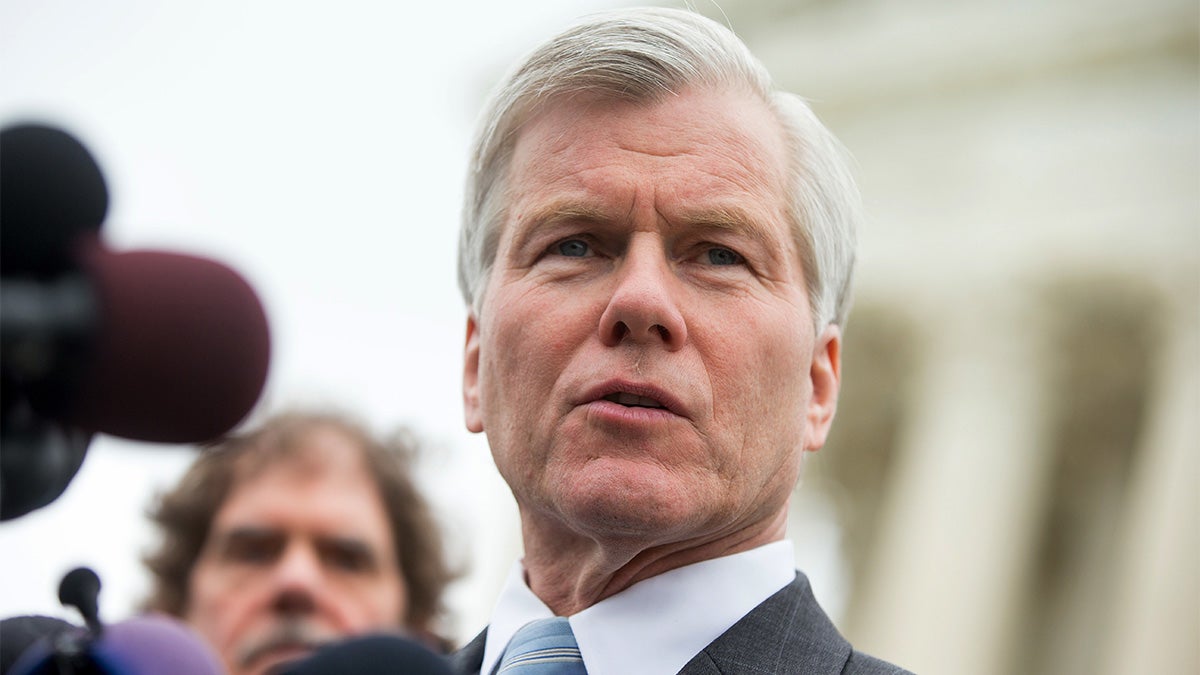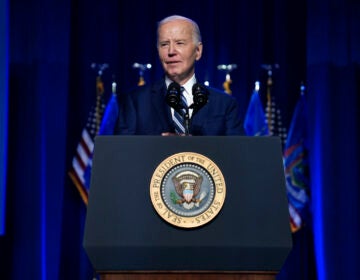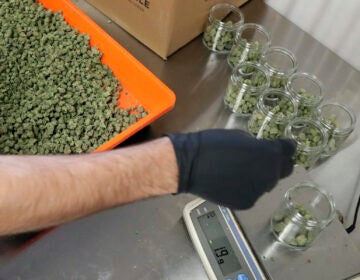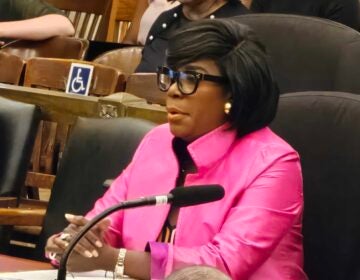Overturn of former Va. gov’s corruption conviction encourages Fattah lawyers
Listen
The corruption conviction of former Virginia Gov. Bob McDonnell was overturned Monday by the U.S. Supreme Court. (AP Photo/Andrew Harnik
Attorneys for convicted U.S. Rep. Chaka Fattah see a ray of hope now that the U.S. Supreme Court has thrown out the corruption conviction of former Virginia Gov. Bob McDonnell.
In a unanimous opinion, the justices concluded that arranging meetings and hosting events for a wealthy businessman who gave McDonnell gifts and loans did not amount to bribery, as prosecutors had alleged. Instead, only concrete actions, like making a straightforward promise and carrying it out, in exchange for contributions, counts as bribery. That said, the justices underscored how they were not condoning unsavory political behavior that can be routine.
“There is no doubt that this case is distasteful; it may be worse than that,” Chief Justice John Roberts wrote. “But our concern is not with tawdry tales of Ferraris, Rolexes and ball gowns. It is instead with the broader legal implications of the government’s boundless interpretation of the federal bribery statute.”
Legal experts said the case will make it more difficult for federal prosecutors to pursue bribery and corruption cases against officeholders.
One question the case centered on: What is considered an official act?
“Setting up a meeting, calling another public official, or hosting an event does not, standing alone, qualify as an ‘official act,'” Roberts wrote.
In contrast, had McDonnell called for a state-funded study of a drug tied to the wealthy business man, rather than just set up meetings about the possibility of studies, that could be seen as bribery, the court said. And even if McDonnell had promised the studies but they never happened, that would’ve counted, too. Though McDonnell never took steps that concrete.
Narrowing the definition of the “quo” in quid-pro-quo schemes (the direct exchange of money or gifts for a political favor) could have a ripple effect on many other pending corruption cases, experts said.
Other cases that could potentially be affected by Monday’s decision include the federal indictment of Pennsylvania Sen. Larry Farnese and the corruption case against U.S. Sen. Bob Menendez of New Jersey.
For Fattah’s case, legal observers said, the one piece of the sprawling indictment that is especially relevant is the involvement of the congressman’s longtime friend Herb Vederman, a wealthy businessman who now resides in Florida. He was convicted along with Fattah in the federal corruption case.
Prosecutors said Fattah used Vederman as a “human ATM machine,” showering him with money and gifts; in exchange, Vederman sought a coveted U.S. ambassadorship.
Prosecutors said Fattah gave Vederman’s girlfriend a job in the congressman’s office, and that Vederman wrote checks to the lawmaker’s son, Chip Fattah, some of which he allegedly gave to his father. Further, the government said, Vederman assisted the Fattahs’ au pair with her college tuition payments and acted as a sponsor for her visa application
Fattah hand-delivered a letter to President Obama advocating that Vederman receive an ambassadorship. And that followed an $18,000 gift to help Fattah pay for a vacation home in the Poconos.
Fattah and his wife, former NBC10 anchor Renee Chenault-Fattah, fabricated the sale of a Porsche to hide the gift, the government said.
Attorneys for Fattah and Vederman declined to comment on how the U.S. Supreme Court decision may impact post-conviction court filings. But the defense attorneys have until July 21 to file motions raising questions about the trial, and many citations from the McDonnell case are expected.
After final judgement, following Fattah’s Oct. 4 sentencing date, attorneys will be able to appeal to the United States Court of Appeals for the Third Circuit.
Political law attorney Adam Bonin, who doesn’t represent any of the defendants, predicted Monday that Vederman-related bribery counts might just fall apart in light of the high court decision.
“All the stuff relating to the ambassadorship,” Bonin said. “Congressman Fattah is alleged to have asked other [federal officials] to look into it, and I think because Fattah is in a subordinate position to them, they’re not going to look at that as asserting pressure to perform an official act.”
At best for the federal government, Bonin said, the Supreme Court case could complicate matters leading up to Fattah’s sentencing in October. At worse for prosecutors, a new trial could be triggered, though that outcome is far less likely.
McDonnell had appealed in part based on what the judge told the jury was the meaning of an “official act,” saying the judge had delivered an overly broad definition.
“In light of our interpretation of the term ‘official acts,’ those instructions lacked important qualifications, rendering them significantly overinclusive,” Roberts wrote.
To put it another way, the jury convicted McDonnell of conduct that wasn’t illegal, despite the jury believing that the behavior did violate federal laws, the court found.
The jury instructions in the Fattah case were much debated by both sides before an agreement, and how exactly the judge described an “official act” to the jury may emerge as the next legal fight.
Bonin, meanwhile, said the Supreme Court case provides some clarity about what is and what is not unlawful when it comes to federal bribery.
“I represent a lot of public officials, and the rules around, ‘Can I take a meeting with someone who happens to be a contributor? If they ask me to do this favor, which has nothing to do with my public duties, is it OK?’ Bonin said. “And they now have clear rules as to what’s allowed.”
Setting up a meeting for a donor with a wink and a nudge is now legally different than explicitly instructing another person of power to help out a contributor, Bonin said. It’s a fuzzy area, though under federal bribery laws, the crime depends on what is considered an “official act” that changes an outcome versus what is just following through on a favor.
“There’s certainly going to be some sort of behavior on behalf of public officials that we may just have to regard as scummy but legal,” he said.
Other watchers were dismayed with the ruling, saying it will make it more difficult to weed out public corruption.
Scott Nelson of the Washington-based consumer advocacy group Public Citizen said making it harder for prosecutors to go after officeholders for alleged wrongdoing sets a disappointing precedent.
“This ruling opens the way for corporate executives and wealthy individuals to undermine our democracy by buying influence at the state level,” Nelson said.
WHYY is your source for fact-based, in-depth journalism and information. As a nonprofit organization, we rely on financial support from readers like you. Please give today.




